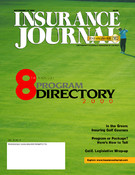As the clock struck midnight on Aug. 30, lawmakers were spent but still deciding the fates of a handful of bills that would affect the insurance industry. So how did the 1999-2000 legislative session compare to other years?
“There is no comparison,” said John Norwood, legislative counsel for the Independent Insurance Agents and Brokers Legislative Counsel (ABL). “We started this year out and…right in the middle, we had this Insurance Commissioner scandal, and that seemed to take the wind out of almost every bill of significance.”
Sam Sorich, vice president and western regional manager for the National Association of Independent Insurers (NAII), agreed. “When you look at what [bills] passed, I think had it not been for the Quackenbush controversy, this would have been a much quieter session for insurers,” he said.
The number one political objective of Senator Jackie Speier (D-Hillsborough), chair of the Senate Insurance Committee, was the Quackenbush deal, according to Norwood. “So bills and committee hearings became secondary, and I think that was true in the Assembly as well,” Norwood said. “Bills happened, but people didn’t have an appetite for a lot of very controversial things.”
In fact, the Senate Committee recommended broad reforms in the wake of the Quackenbush scandal. The reforms were contained in the Senate Insurance Com-
mittee’s report on its five-month investigation of the former Insurance Commissioner, who resigned July 10 rather than face impeachment.
The bottom line is that whenever a “scandal” arises, legislative action has to be taken to address the issues at hand. “Had it not been for the Quackenbush controversy, we probably wouldn’t have seen a number of bills advance—and that’s just the legislative reality,” Sorich said.
AB 481, SB 1524 and SB 2107
Diane Colborn, senior legislative advocate and counsel for the Personal Insurance Federation of California (PIFC), referred to three bills—AB 481, SB 1524 and SB 2107—as the “trilogy” stemming from the downfall of California’s Insurance Com-
missioner.
• AB 481 would require that all settlements must provide for restitution to claimants when the Insurance Commissioner determines that an insurer has failed to comply with fair claims settlement practices.
• SB 1524 would prohibit the use of settlement money for public service television spots that feature the Commissioner.
• SB 2107 establishes certain restrictions and limitations on the Commissioner pertaining to the settlement of administrative actions.
“It’s pretty clear where these three bills came from,” Sorich said. “They are a direct reaction to the Quackenbush scandal.”
SB 1899
Norwood, Sorich and Colborn all ranked SB 1899 as one of the most significant bills of the session. Authored by California Senate President Pro Tempore John Burton, the bill would revive claims from the 1994 Northridge Earthquake that would otherwise be barred because the statute of limitations expired.
SB 1899 lifts for one year the expired statute of limitations on damage claims from the Northridge quake. The bill would not apply to any claim where a court settlement or a written agreement between the insured and insurer had been reached in which the insured had legal counsel.
SB 1899 is now on the Governor’s desk, and even with the changes that have been made to the original version, both PIFC and NAII remain strongly opposed. NAII feels that the bill would rewrite insurance contracts entered into more than six years ago and would invite fraud.
PIFC feels the bill would initiate a costly, litigious and cumbersome process of inappropriately and unconstitutionally impairing existing contracts, and could invite the filing of fraudulent claims years after the event which supposedly caused the loss.
SB 1805
SB 1805, authored by Senator Martha Escutia (D-Whittier) and rushed through the last days of the session, is another bill that Sorich added to his “hit parade.” The bill—which was probably the most controversial Quackenbush—related bill still outstanding in the closing days of the session-would make public the heretofore confidential Department of Insurance studies (market conduct examinations) of insurers’ handling of claims.
Currently, it is up to the discretion of the Commissioner whether or not to release market conduct reports. SB 1805 will take away that discretion.
“Procedurally what happened was that it was amended around noon on Aug. 30, they had a hearing at 7 p.m., the Assembly passed it that night, passed it over to the Senate, they held a hearing at 9 p.m. and at 10:30 p.m., the bill was passed,” Sorich explained. “So that was your government in action. Personally, I don’t think it got the kind of hearing that it merited, because it was pretty much rushed through.”
After the bill was gutted and amended, PIFC removed its opposition, but NAII still opposes SB 1805. According to Sorich, the discretion should remain with the Commissioner. “The Commissioner has the power today to disclose examination reports, and we think it’s a good idea to continue to give the Commissioner that discretion on a case-by-case basis rather than a blanket statutory mandate,” he said.
AB 393
After four years of hard work to modernize and update California’s insurance agent and broker licensing law, AB 393, the agent licensing bill authored by Jack Scott (D-Altadena), reached Governor Davis’ desk.
And on Sept. 5, the Governor signed AB 393 into law.
ABL—with the backing of groups such as the American Agents Alliance, California Insurance Wholesalers Association, Insurance Brokers Society of Orange County and of Southern California, and Professional Insurance Agents of California and Nevada—called on Governor Davis to sign AB 393 into law. Meanwhile, PIFC remained neutral on the bill.
“We represent companies that have a variety of different marketing approaches,” Colborn said. “Some use independent agents, some are direct writers, so we followed it with great interest, but never took a position on the bill.”
Other insurer associations lobbied against the bill. In fact, NAII asked Governor Davis to veto AB 393. “The thing that troubles us is that it restricts the exemption that insurance company employees now have from licensure, and so we’re opposed to that angle of the bill,” Sorich said. “We’re hung up on this one issue, but we feel it’s important.”
Nevertheless, the new law will require that all persons transacting insurance will be licensed by the state, protecting consumers by making sure policies are provided by knowledgeable, licensed agents.
SB 996
SB 996, a workers’ comp measure aimed at raising temporary and permanent disability rates for workers injured on the job, was on the debate table for months. The measure was approved by the Senate on a 24-14 vote and then passed by Assembly on a 41-28 vote. The Governor has until Sept. 30 to sign or veto the bill.
“Nobody ever thought workers’ comp was going to happen,” Norwood said. “But what’s really going to be interesting is what happens between now and next session with regard to the marketplace, in terms of pricing the product, the California economy, and whether or not we’re going to have any more insolvencies.”
This will make for a major play next year, Norwood said. “There is going to be a whole new group of people involved in comp reform—Pat Johnston [author of the bill] has been termed out—so this will be a big issue next year,” he added.
In fact, Norwood said that he thinks next year is going to be a “real defensive” year altogether. “We’ll have significant changes in both insurance committees—and we’ll have some new members of both houses—so here we go again,” Norwood said.
Was this article valuable?
Here are more articles you may enjoy.


 Charges Dropped Against ‘Poster Boy’ Florida Contractor Accused of Insurance Fraud
Charges Dropped Against ‘Poster Boy’ Florida Contractor Accused of Insurance Fraud  Maine Plane Crash Victims Worked for Luxury Travel Startup Led by Texas Lawyer
Maine Plane Crash Victims Worked for Luxury Travel Startup Led by Texas Lawyer  Chubb Posts Record Q4 and Full Year P/C Underwriting Income, Combined Ratio
Chubb Posts Record Q4 and Full Year P/C Underwriting Income, Combined Ratio  AIG, Chubb Can’t Use ‘Bump-Up’ Provision in D&O Policy to Avoid Coverage
AIG, Chubb Can’t Use ‘Bump-Up’ Provision in D&O Policy to Avoid Coverage 


